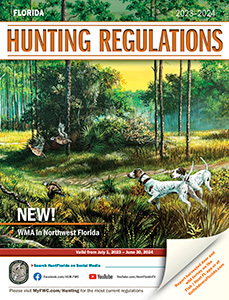Introduction
This publication is provided as a guide to Florida hunting laws and regulations; however, the Wildlife Code of the State of Florida is the final authority on hunting laws. The Florida Wildlife Code, Division Number 68A of the Florida Administrative Code, can be obtained at www.flrules.org. The FWC strives to ensure the information in this publication is accurate but assumes no liability for substantive or typographical differences between this publication and the Florida Administrative Code. If you have questions regarding hunting laws and regulations, contact an FWC regional office (see below). This publication is valid from July 1, 2023 through June 30, 2024.
Definitions
- Game—resident game birds, game mammals and migratory game birds
- Resident game birds—quail and wild turkey
- Game mammals—deer, gray squirrel, rabbit and black bear
- Migratory game birds—ducks; snow (including blue), Ross’ and Canada geese; common gallinule (moorhen); coot; snipe; rail; woodcock; and mourning and white-winged dove
- Non-migratory game—resident game birds and game mammals
- Furbearers—bobcat, otter, raccoon, opossum, coyote, beaver, skunk and nutria
Information regarding bear management is not contained in this handbook. Please visit MyFWC.com/Bear for information.

The FWC receives financial assistance from the Department of the Interior, U.S. Fish and Wildlife Service. The DOI prohibits discrimination on the basis of race, color, national origin, age, sex or disability. If you believe you have been discriminated against in any program, activity or facility or need more information, contact:
FWC, Office of Human Resources
620 S. Meridian St.
Tallahassee, FL 32399
850-488-6411
or:
Office of Diversity, Inclusion & Civil Rights Dept. of the Interior
1849 C St. NW
Washington, D.C. 20240

